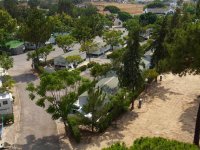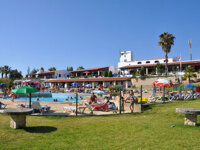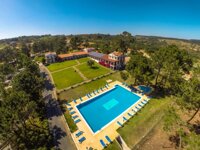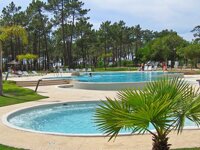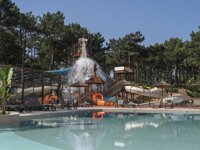Exploring Southern Portugal
Portugal may be one of Europe’s top destinations but many head to the cities of Porto and Lisbon, or perhaps a resort in the Algarve. All the more reason why a road trip along (part of) the Portuguese coast is such a rewarding experience. Quite simply, you will avoid most of the crowds and have so much to yourself.
Sorry, this map cannot be displayed.
The following consent is required:
Tracking & performance, Targeting & advertising.
This Alan Rogers itinerary suggests a broadly coastal route, with campsite options and a few highlights along the way that you might like to check out. Of course, vast swathes of inland Portugal are little visited yet offer majestic prairie-like countryside, dotted with cork trees and countless wildflowers in spring. Follow your instinct and venture away from the coast on occasion and explore one of Europe’s least populated regions.
The Algarve – golden sands and whitewashed houses

With its promise of undiluted sunshine, golden sandy beaches and bustling market towns, it’s no surprise that the Algarve draws visitors all year round. While some stretches of coastline are very developed, there are plenty of places to explore for a more low-key experience.
Resorts such as Lagos and Albufeira aside, the Algarve retains a distinctly traditional Portuguese feel. Further west the coastline becomes wilder and the dramatic Serra de Monchique mountains rise to separate the Algarve from its neighbour the Alentejo.
Moorish influences are very apparent in the Algarve architecture, with traditionally painted ceramic tiles adorning the whitewashed houses. All in all, it’s an irresistible region and a great way to ease yourself into this journey around the Portuguese coast.

Faro’s Old Town
Founded by the Romans and with monuments dating from the 16th century cheek by jowl in the Old Town, Faro has a small centre well worth investigating.
The Cidade Velha is compact, so easy to navigate on foot, and offers Moorish influences, orange trees, an elegant cathedral and the Paço Episcopal (The bishops’ palace).

Benagil cave
As you head along westwards, drop down to Carvoeiro on the coast. Something of a Portuguese headline attraction, this sea cave is a vast cavern with a hole in the ceiling, through which the sunlight pours, highlighting the beautiful rock strata and sandy beach below. You can only reach it from the sea – boat trips, kayaks and paddleboards.
Lagos - the old and the new

Start with the ancient seaport, one of the key Portuguese ports used by world-changing explorers during the Age of Discovery: Vasco da Gama, Eannes, Dias, Magellan, Vasco da Gama and Columbus were familiar with its waters. Venture inside the 16th-century walls and explore the little cobbled streets and delightful squares to get a real sense of history.
Beach lovers head for Meia Praia, the 4 km curve of fine sand, complete with watersports and easy-going beach bars.

Ponta da Piedade
Just south of Lagos, this popular vantage point of sandstone juts out into the Atlantic and provides sweeping sea views, east Carvoeiro and west towards rugged Sagres.
The cliffs have eroded to form intriguing stacks, bridges and caves and there’s a lighthouse. If your timing is good (spring is most reliable), you’ll see nesting seabirds, wild orchids and turquoise waves far below your feet.
Explore Ponta da Piedade in 360°

Praia de Luz
This delightful seaside resort is about an hour’s drive from Faro and centres on a safe, sandy beach that is ideal for youngsters.
Facilities are excellent with For a change of scene take a boat trip, maybe dolphin watching, or visit the grottoes and caves along the coast.

Sagres
Like Land’s End in Cornwall and Finistère in Brittany, Sagres has something of an ‘edge of the world’ feel.
At Cabo de São Vicente, Europe’s most south-westerly spot, rugged cliffs rise high over the white-crested waves as it steadfastly faces out into the wild Atlantic.
Explore Cabo de São Vicente in 360°

Zambujeira do Mar
This is a small fishing village that is blessed with some of the best beaches along this coastline. Think rolling waves, huge tracts of sand and cliffs rising up behind for sensational sea-views. Excellent watersports are on offer yet it also is popular with nature lovers.
Explore Zambujeira do Mar in 360°
Costa Vicentina – a walk on the wild side

This is one of Europe’s finest undeveloped stretches of coastline, a seriously overlooked region of wild and raw natural beauty. Running between Odeceixe and Burgau, it is part of the Parque Natural do Sudoeste Alentejano. Unspoiled, with little villages, empty beaches, craggy cliffs – and amazing seafood – this is an authentic paradise for lovers of the real outdoors.
The beaches are fantastic – epic and wide, backed by dunes and cliffs and pounded by Atlantic surf. It’s a paradise for serious surfers, drawn by the laid-back vibe of the beach-shack bars and easy-going atmosphere. Walkers come for the splendid isolation of the endless clifftops trails, the wildflowers that sprout up in spring, the countless rockpools.
Discover the Rota VicentinaThe Rota Vicentina is 400 km of protected trail, split between a historical route and the ‘fisherman’s route’. It’s a trail well-trodden by pilgrims, tourists and nature lovers and provides a unique perspective on this stunning coastline along which you are travelling.

Santiago do Cacém
This hidden gem is inland but well worth a diversion. You’ll find the medieval castle walls dominating the skyline, first constructed by the Moors. But the Romans were here first, and at Mirobriga you can see remains of the hippodrome, several houses, baths and more.
Take a stroll through the twisting little lanes of the old town and soak up the timeless atmosphere of the white-washed buildings, the terracotta roofs and the bell towers.
Praia do Malhão
Comprised of several separate beaches, Malhão beach is set within the Costa Vicentina Natural Park. It’s backed by rocky dunes and the sea can be invigoratingly wild here – the breakers keep on rolling in, ideal for the many surfers who congregate here.
Tróia Peninsula – the glamour and the high life

If you can, take a drive along the Tróia peninsula with the Atlantic to your left and the Sado estuary to the right. This is the chosen spot for many Lisbon residents, not to mention European royalty and Hollywood celebrities, but there’s plenty of space for all.
In fact, it’s also home to bottlenose dolphins thousands of white storks and flamingos that cut quite a dash wading in the water’s margins. Cycle along the pine-fringed Parque Natural da Arrábida or walk along the ribbon of golden sand at sunset – it’s very beautiful and a good place to take a boat cruise for some dolphin spotting.

Setubal castle
The Forte de Sao Filipe is a notable landmark, a 14th-century fort that has been painstakingly restored and sensitively converted into a hotel.
Visitors are welcome to explore the ramparts and enjoy the sweeping views over the port and out to sea.
When to go
In short, ideally aim for a window between April and October. This would mean you avoid the coldest winter months. Driving along the often tempestuous Atlantic coast can mean chilly winter weather, not to mention strong winds. And yet the mild winter climate of the Algarve makes it a popular destination for the ‘snowbirds’ in search of some winter sun.
And if you can avoid the high summer months, especially August, you will of course also avoid the queues and associated costs of high season. That all said, serious hikers, botanists, and even surfers might find the winter appealing, so each to their own.
